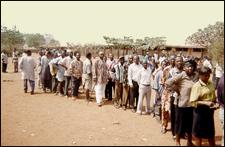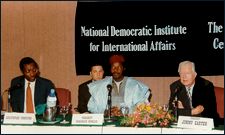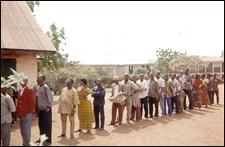|
They Came, They Observed
By Mudiaga Ofuoku
NewsWatch, Nigeria
June, 1999
When observer groups first surfaced on the Nigerian
electoral scene to witness the presidential election of June 12, 1993,
Nigerians considered the idea an entirely novel one. Today it has grown
to become an accepted feature of the country's electoral process, with
local observer groups also taking part in it.

Voters line up to cast ballots in
Enugu, Nigeria, February 1999 About 12,000 accredited election monitors assessed the
February 27, 1999 presidential election between Olusegun Obasanjo, a retired
general and former head of state, and Olu Falae, former finance minister
in the Ibrahim Babangida military regime. Of this vast number about 2,000
were foreign observers drawn from different organisations. They came to
witness the election at the invitation of General Abdulsalami Abubakar,
head of state and Ephraim Akpata, chairman of the Independent National
Electoral Commission, INEC.
The European Union, EU, sent 100 observers and the Commonwealth sent a 23-member delegation called the Commonwealth Observer
Group, COG.
The Carter Center in collaboration with
the National Democratic Institute for International Affairs, NDI, based
in Washington, D.C., and the Human Rights Watch as well as observer
groups equally from Canada, Norway, Japan and some African countries
were here too.

Delegation leaders former US
President Jimmy Carter,
former President of Niger
Ousmane and Chris Fomunyoh
at a press conference in Abuja,
Nigeria The Carter Center was led by former President Jimmy
Carter of the United States. In Carter's entourage were Mahanane Ousmane,
former Niger president, and Colin Powell, former chairman of the U.S joint
chiefs of staff. Leading the NDI was Chris Fomunyoh. The 23-member COG was led by Ketumile Masire, former
president of Botswana. The 100-member European Union Observer Mission,
EUOM, was led by Hans-Gunter Sulimma, former German ambassador to Canada.
The International Republican Institute, IRI, another US-based group, was
led by Ed Royce.
The over 10,000 domestic observers came from different
non-governmental organisations, NGOs.
The Transition Monitoring Group, TMG, and the Abuja
NGO Coalition for Democracy and Good Governance contributed a vast majority
of the members. Each of these NGOs is a coalition of over 50 other NGOs
and human rights organisations.
The number of observers that
witnessed the 1999 presidential election far outstripped that which
monitored the one of 1993. About 3,000 observers assessed the one of
six years ago. Of this number, 135 of them were foreign. Britain contributed
24 observers, the largest. The British team, which had four parliamentarians
in it, was led by the then British mhigh commissioner in Nigeria. But
unlike the 12,000 foreign and local monitors who were accredited by
INEC in the recent election, the 3,000 monitors in the ill-fated 1993
presidential election were accredited by the Centre for Democratic Studies,
CDS, then headed by Omo Omoruyi. Omoruyi said then that the observers
were invited to give credibility to the elections.
 The same reason probably informed the decision
by INEC and Abubakar to invite this year's observers. At a meeting in
early February, of the INEC and the TMG, Akpata said his commission believed
in election observation and monitoring. Akpata, who was represented by
Steve Osemeke, INEC's director of public affairs, said the reports submitted
by the observers who monitored the local government, states' houses of
assembly and governorship elections had been very useful, to the commission
in appraising its strategies for future elections.
Clement Nwankwo, the TMG director, said his group was
involved in election monitoring in order to contribute meaningfully
to the conduct of a credible and acceptable election in Nigeria.
There are reasons why the foreign bodies sent a large
retinue to the elections. The western countries attach so much importance
to democracy. They are eager to see Nigeria fully back in the democratic
club.
Said Chris Fomunyoh, regional director for East, Central,
and West Africa at the NDI: "This (presidential) election has great
meaning for the rest of Africa. If democracy can be peacefully rooted
in this powerhouse of a nation (it could create) the democratic tide
that raises other nations in Africa as well."
Less than two weeks to the presidential elections Powell,
had said that "this election is a critical step in the transition to
civilian rule. We are hopeful that Nigerians will have confidence in
the process and that they will turn out to vote in large numbers on
election day."
Addressing a tripartite meeting of the COG, INEC and
the police two weeks ago in Abuja, Masire, leader of COG, said the successful
conduct of the election would pave way for Nigeria's re-admission into
the Commonwealth. Nigeria is a very important member of the organisation.
The method applied by both local and foreign observers
during the presidential election was no different from that employed
during the preceding elections, especially the election to the national
assembly. It was a painstaking job indeed. For example, the 100 observers
from the EU operated in teams of two. They were deployed in the 36 states
of the federation and in the federal capital territory. The teams observed
the erection of polling stations, the accreditation of registered voters,
the poll and the count at polling station level. The teams then proceeded
to monitor the collation of the results at ward and local government
area centres.
In all the 100 observers visited over 900 polling stations
and witnessed collation of results at 200 centres. The COG also observed
the process from start to completion, using its own method. Its members
travelled to many parts of the country before, during and after polling.
The Carter Center-NDI observers did the same thing in 24 states and
reconvened in Abuja to discuss their findings after which they issue
a preliminary report of their observation.
Both the foreign and local observers were unanimous
in their findings. Although the exercise took place peacefully nationwide
there were nevertheless instances of electoral abuse, such as falsification
of voters and stuffing of papers into ballot boxes. Addressing a world
press conference in Abuja the following day, Sunday 28, Carter said
members of his monitoring group witnessed serious irregularities and
overt electoral fraud. "It appeared that many of these electoral abuses
were a result of collusion between polling officials and party agents
and operatives," observed Carter.
In a letter to INEC chairman the following day, Monday,
March 1, 1999, Carter said: "Regrettably it is not possible for us to
make an accurate judgement about the outcome of the presidential election."
But all the other groups including the ones despatched by the Organisation
of African Unity, OAU, said the election results reflected the wishes
of the Nigerian people.
It was not clear at press time how much it cost the
observer teams. The EU said it spent a total of $4 million on the electoral
process, both in technical and direct financial form. It said it provided
the assistance to both INEC and the Transition Monitoring Group of local
Nigerian observers, and its 100 observers. The Carter Center and the
NDI also spent undisclosed large amount of money on the exercise, especially
by setting up the TMG and opening up offices in Nigeria since last November.
The Commonwealth is equally believed to have spent considerable financial
resources on the exercise. Masire, who led his 23-member team to the
country, February 12, declined to tell Newswatch how much the organisation
was spending on the process. In spite of their huge financial, technical
and logistical commitments, some critics initially expressed reservations
about the neutrality of some foreign members. This led Carter to reassure
Nigerians that he had no special interest in any particular candidate.
Carter had observed more than 15 elections worldwide. At a recent workshop
organised by the EU, Bolaji Akinyemi, former external affairs minister,
wondered if Nigeria needed as many as 2,000 foreign monitors. He advised
that a maximum of 500 foreign monitors would be enough.
Overall, observers said the idea was perfectly in order.
The Daily Times, for instance, lauded the monitors for their roles during
the whole exercise. It said: "We believe that the international monitoring
groups and their local counterparts have conducted themselves creditably,
pointing out errors and making suggestions, which have helped the INEC
to improve on its performance." |

